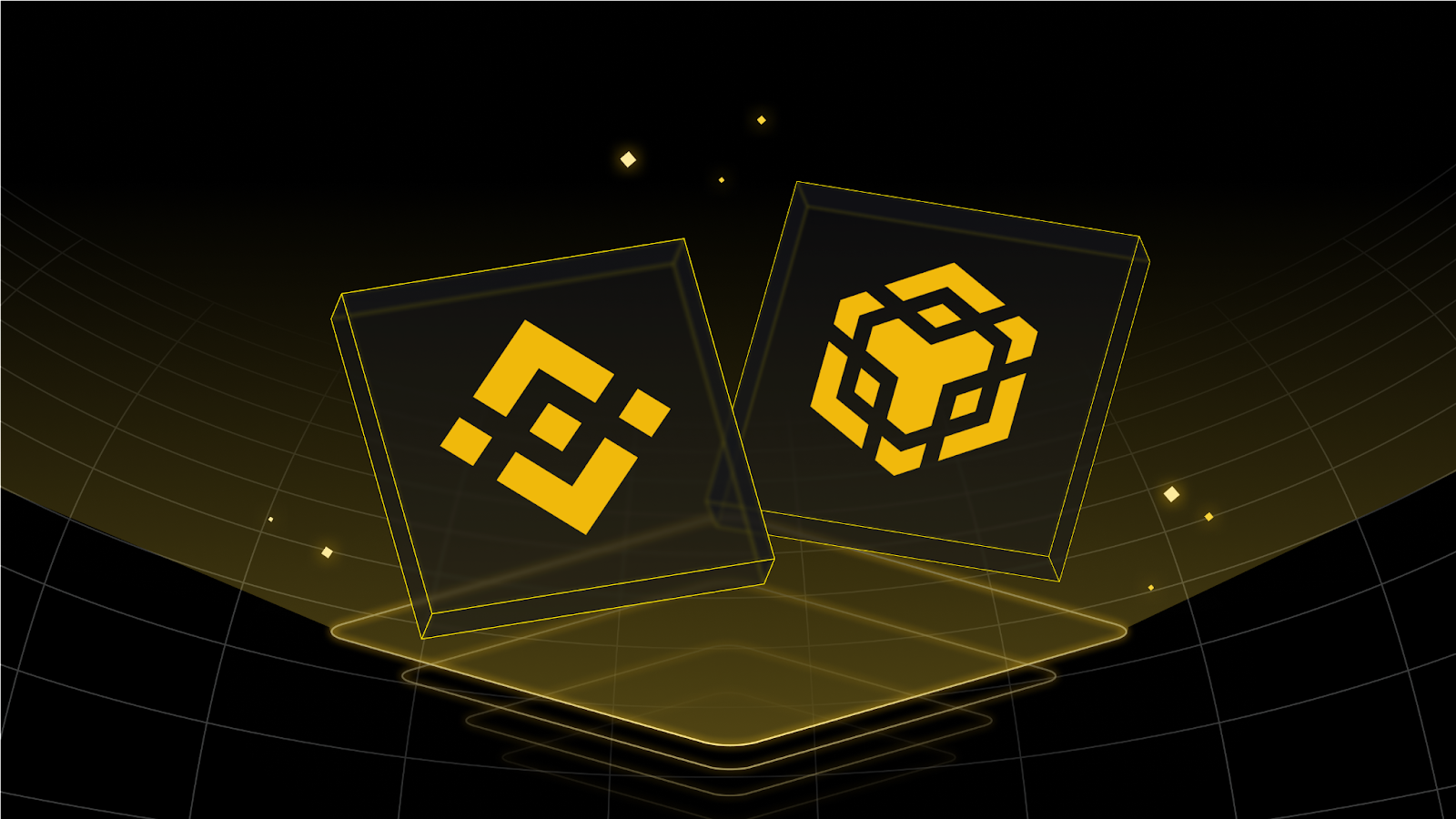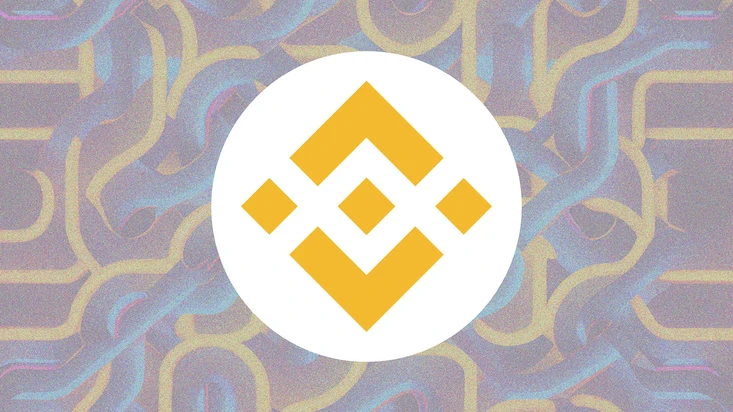
What Is BNB Chain (BNB)?
BNB Chain, formerly known as Binance Smart Chain (BSC) is a blockchain network that was launched by Binance, one of the world's leading cryptocurrency exchanges. The acronym BNB, as explained by Binance CEO Chanpeng Zhao, stands for "Build 'N Build". In Zhao's words, BNB embodies the spirit of "building the community, and letting the community build, build, and build."
BNB Chain is a dual-layered blockchain system, comprising the BNB Beacon Chain (BC) and the BNB Smart Chain (BSC). The BNB Beacon Chain plays a crucial role in the governance of the BNB Chain, overseeing staking and voting mechanisms. On the other hand, the BNB Smart Chain is an Ethereum Virtual Machine (EVM)-compatible blockchain that houses consensus layers and serves as a hub to multiple chains. This structure ensures that even if one network goes offline, the other can continue to operate. The interoperability between the two networks also allows users to easily move currencies between them.
Source & Copyright: Binance Blog
The journey of BNB Chain began with the establishment of Binance Exchange in 2017 Over the years, Binance has grown exponentially, becoming a household name in the cryptocurrency world. Recognizing the need for a more advanced blockchain solution to support its expanding business, Binance launched its first blockchain Binance Chain (now called BNB Beacon Chain) in 2019.
The Binance Chain was primarily designed to facilitate the trading of assets. It served as the native blockchain for the project, enabling users to issue, use, and exchange digital assets in a decentralized manner. However, it had certain limitations, particularly in terms of programmability. To overcome these challenges and cater to the growing demand for decentralized applications (DApps) and DeFi, Binance developed the Binance Smart Chain.
Binance Smart Chain was designed to run concurrently with Binance Chain, offering users the best of both networks - high transaction capacity and smart contract functionality. The primary goal of the platform was to enable developers to create DApps and help users manage their digital assets cross-chain. In 2022, Binance Smart Chain was merged with Binance chain and rebranded to BNB Chain.
BNB token is the native token of the BNB chain, it was initially created as a utility token for the Binance exchange and made its debut as an ERC-20 token on the Ethereum blockchain.
After Binance launched its blockchain, the BNB token was transitioned onto this new platform. The primary function of BNB is to offer users of the Binance exchange a discount on trading fees. When traders choose to pay their fees using BNB, they can earn themselves discount of up to 25% on spot and margin trading fees. For those engaged in futures trading, the use of BNB can lead to savings of up to 10% on fees.
Furthermore, Binance has a practice of periodically allocating a portion of its earnings to repurchase and "burn" (or permanently remove) BNB tokens. This practice effectively reduces the overall supply of BNB over time, a strategy that can potentially increase the token's value.
Other Chains Under Development
Within the BNB Chain, there are three distinct blockchains presently in the development phase: zkBNB and opBNB. The foundation of these networks is built on optimistic and zero-knowledge rollups for scaling. Both these networks, zkBNB and opBNB, are designed to support scalable dapp creation, promising greater transaction capacity and little to no associated costs.
BNB Greenfield stands as the fifth network in this ecosystem. This decentralized storage network is crafted especially for the demands of data-heavy decentralized applications, specifically in the gaming and social media sectors of the BNB space. Greenfield works in tandem with its sister networks in the BNB ecosystem and aspires to provide storage solutions that are programmable and compatible with smart contracts on the BNB Smart Chain.
How Does BNB Chain Work?
As mentioned before BNB chain is composed of two layers: BNB Smart Chain and BNB Beacon Chain.
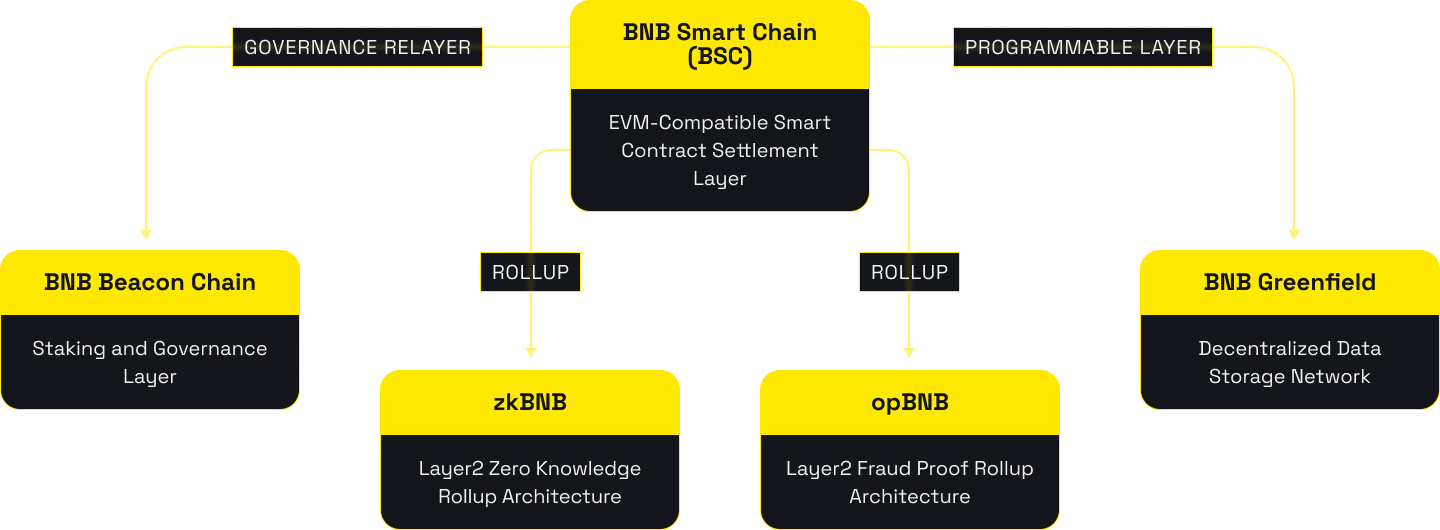
Source & Copyright: BNB Documentation
BNB Smart Chain is powered by a system of 50 validators. These validators function based on a Proof of Staked Authority (PoSA) consensus mechanism, which facilitates short block times and lower fees. The validators with the highest amount of staked tokens become the chosen ones to produce blocks. The system is designed with safeguards such as double-sign detection and malicious vote detection, ensuring the security, stability, and finality of the chain.
In addition to the 29 active validators, BNB Smart Chain incorporates more validators, for instance, an additional 20 inactive validators, into the validator set as backups. These backups, referred to as "Candidates", have the capacity to produce blocks and charge gas fees on the BNB Smart Chain mainnet, even though less frequently than the 29 elected validators. In the event of unavailability, these candidates are also subject to slashing, though at a smaller scale. This system ensures that candidate validators are motivated to maintain quality and contribute to the security of BNB Smart Chain.
In extreme scenarios, if a majority of the active 29 validators are compromised and go offline, the Candidate Validators can report the stale blocking to the BNB Beacon Chain, resume it, and eventually propose a re-election of the active validator set.
BNB Smart Chain also supports smart contracts and protocols compatible with the Ethereum Virtual Machine (EVM). The BNB Beacon Chain implements the staking and governance layer of the BNB ecosystem. It boasts a flexible set of native assets and pluggable modules for governance, staking, and more. The BNB Beacon Chain uses Tendermint for consensus, and its application logic is built upon the Cosmos SDK. It aims for fast block times, a native dApp layer, and multi-token support without the need for a smart contract Virtual Machine (VM).
The BNB Beacon Chain supports a variety of features, including sending and receiving BNB and digital assets, issuing new digital assets, and managing digital assets. It also facilitates governance for the BNB Beacon Chain and side chains, staking of side chains, and cross-chain transfers and communications.
The BNB Beacon Chain employs Tendermint Core, a Byzantine fault-tolerant (BFT) consensus engine, which is robust against double-spend attacks and can tolerate up to approximately 33% Byzantine actors in the network. In this protocol, validators take turns proposing blocks of transactions and voting on them Currently, there are 11 validators in the BNB Beacon Chain mainnet, with the potential for more participants to join as validators.
Who Are the Founders and Investors of BNB?
The BNB Chain was developed by the team at Binance, led by its CEO, Changpeng Zhao, often known as CZ. The Binance team is said to be composed of a diverse group of individuals with extensive experience in blockchain technology, finance, and software development.
He Yi is another co-founder of Binance, she has been an influential figure in the Chinese cryptocurrency and blockchain industry. Before Binance, He Yi co-founded OKCoin, another prominent crypto exchange.
Initially, Binance was bootstrapped by its founders. However, to fund its operations, Binance launched an Initial Coin Offering (ICO) for Binance Coin (BNB) in July 2017. This ICO attracted numerous individual and institutional investors.
While the specific investors from the ICO are numerous and varied, the key point is that the Binance ICO was among the most successful token sales of its time, raising approximately $15 million.
What Is BNB Price Today?
The current BNB price today is $659.85 with a 24-hour trading volume of $442,168,676.
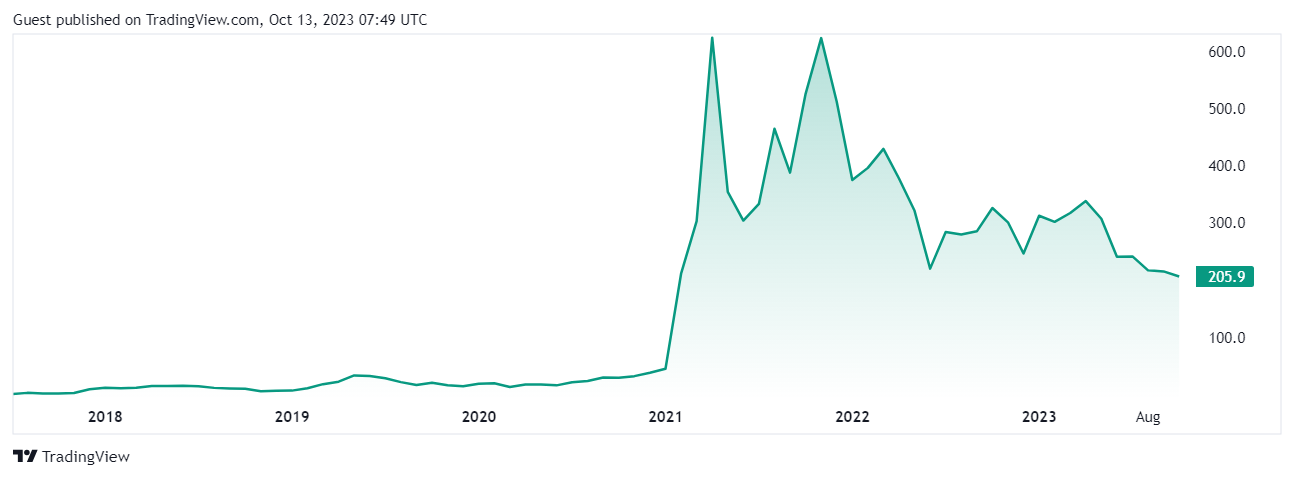
Source & Copyright: TradingView
What Is the All-time High for BNB Chain (BNB)?
BNB reached its all-time high on May 10, 2021, when it traded for just over $686USD. There were several factors contributing to BNB's surge in price leading up to its all-time high.
One of the most significant catalysts for the rise of BNB was the rapid adoption and growth of BNB chain. The platform became a popular alternative to Ethereum, especially during times when Ethereum faced congestion and high transaction fees. BNB chain's compatibility with Ethereum made it easier for developers to deploy their projects on BSC, further driving demand for BNB as it's used for transaction fees on the chain.
Binance incorporated new DeFi components to counter the loss of market share to decentralized finance protocols and swiftly listed new DeFi projects, which often led to a surge in trading volume and price of the listed token.
Binance, as one of the world's largest cryptocurrency exchanges, has a considerable influence on the market. Their aggressive marketing, regular coin burns, and expansion of services (like Binance Pay, Binance DEX, Binance Card, etc.) all positively impacted the perception and demand for BNB.
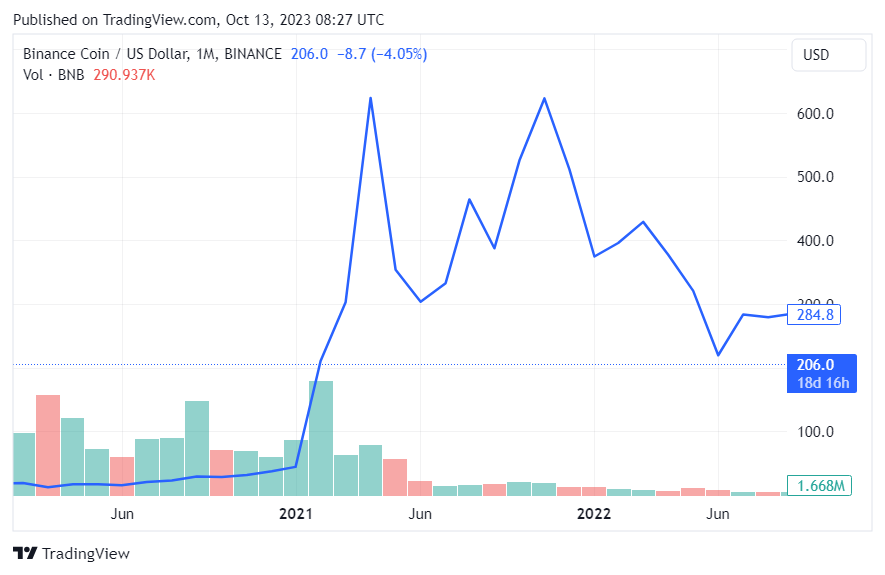
Source & Copyright: TradingView
Binance continuously innovated and introduced new services and features, further integrating BNB into its ecosystem. This constant development added to the utility and demand for BNB.
The entire cryptocurrency market experienced a significant bull run during late 2020 and the first half of 2021. Bitcoin reached its all-time highs during this period, and the positive sentiment generally spilled over to altcoins, including BNB.
What Is the All-time Low for BNB Chain (BNB)?
BNB was introduced in 2017 through an ICO, and like many other cryptocurrencies that launched around that time, its price was relatively low in its early days before it gained significant attention and adoption. The BNB price at the time of the ICO was 15 cents. The month following ICO, BNB token reached its all-time low of $0.09 on October 19, 2017.
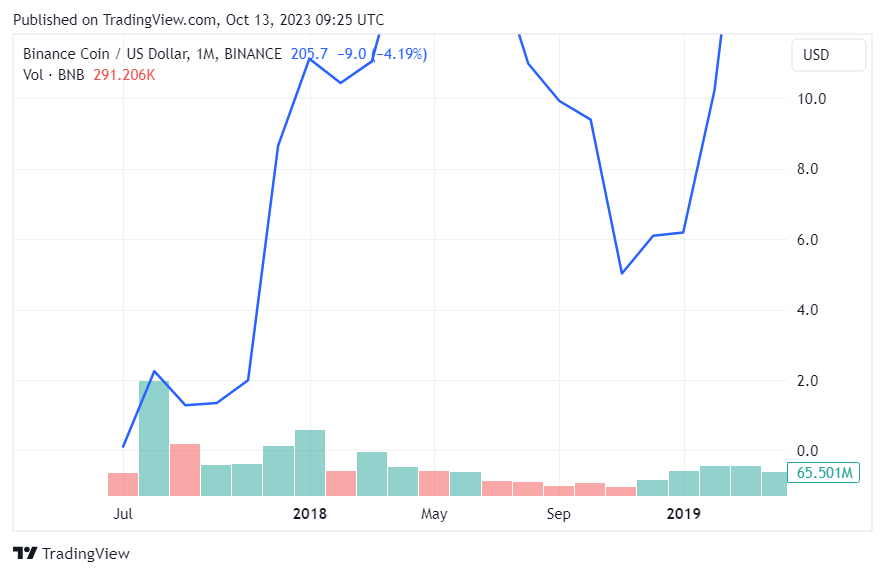
Source & Copyright: TradingView
What is the Market Cap of BNB Chain (BNB)?
BNB currently holds a market capitalization of $94,493,753,689. There are 145,887,575 of BNB coins in circulation. Check this page regularly to stay updated on BNB's market cap.
How and Where to Buy BNB Coin?
Buying Binance Coin (BNB) is an easy task, but it requires you to follow specific steps, especially if you're new to the world of cryptocurrencies. Here's a general guide on how and where to buy BNB:
Choose a cryptocurrency exchange or platform. Naturally, Binance is the primary platform where you can buy BNB. It's one of the world's largest cryptocurrency exchanges and offers a wide variety of pairs for BNB. BNB is also listed on various other exchanges due to its popularity. Some of these include KuCoin, Kraken, Bitfinex, and many more.
If you're new to the chosen exchange, you'll need to sign up for an account. This process typically involves providing an email address, setting a password, and verifying your email. Some exchanges may require you to pass the KYC (Know Your Customer) procedure.
Once your account is set up, you'll need to deposit funds, either fiat or cryptocurrency, then navigate to the trading section of the exchange, select the pair you want to trade (e.g., BNB/USD if you're buying with US Dollars), enter the amount of BNB you want to purchase, confirm the transaction details and execute the trade.
How to Sell BNB Coin?
Selling Binance Coin (BNB) is similar to the process of buying it but in reverse.
Choose a cryptocurrency exchange if you haven't already, decide where you want to sell your BNB, and then deposit BNB to the exchange. Once your BNB has been deposited and confirmed on the exchange, navigate to the trading section and select the desired trading pair. Enter the trade details. Choose the type of order (e.g., market order, limit order).
- A market order will sell your BNB immediately at the current market price.
- A limit order allows you to set a specific price at which you want to sell your BNB.
The trade will only execute once the market price matches your set price. Enter the amount of BNB you wish to sell. Review the trade details, including any fees. Confirm and execute the trade. Once executed, your BNB will be sold, and you'll receive the currency you traded it for.
Is BNB Coin Legit?
Binance Coin (BNB) legitimacy stems from different factors.
BNB was introduced by Binance, one of the world's largest and most respected cryptocurrency exchanges. Binance has maintained a strong reputation in the cryptocurrency industry, and BNB, by extension, benefits from this reputation.
Over time, the utility of BNB has expanded significantly. It's not just for fee discounts anymore. BNB is used as gas on BNB Chain, in token sales on Binance's Launchpad platform, for transaction fees on Binance DEX (decentralized exchange), in various DeFi projects on BNB Chain, and more. This wide utility has driven its adoption across various sectors of the crypto world.
BNB has consistently been among the top cryptocurrencies by market capitalization. Its wide recognition and adoption make it one of the most well-known tokens in the industry.
A common concern regarding the coin is its close association with the Binance exchange. This means that the coin's reputation is intertwined with that of the exchange. Furthermore, Binance has faced scrutiny from U.S. law enforcement agencies amid concerns over potential money laundering and tax evasion activities on the platform. Such regulatory attention could impact the BNB coin's standing.
What Makes BNB Unique?
The BNB Chain stands out due to its innovative dual blockchain framework, consisting of the Beacon Chain (previously Binance Chain) and the BNB Smart Chain (once known as Binance Smart Chain). These blockchains operate concurrently, each bringing distinct attributes and capabilities.
BNB's uniqueness comes from its wide array of use cases, its evolution from a simple fee discount token to a foundational asset in a growing ecosystem, and its backing by a major player in the cryptocurrency world.
One of the primary uses of BNB is to pay for transaction fees on the Binance Exchange. Users can choose to pay their trading fees in BNB, which can lead to significant discounts.
BNB has become an integral part of many Binance products and services. For instance, users can participate in token sales on Binance Launchpad using BNB. It's also used in Binance's token launch platform, where it can be staked to farm new tokens.
BNB is also used as a payment method for certain services on the Binance platform. For example, users can use BNB to pay for travel bookings, gift cards, or even goods and services from merchants that accept BNB as a payment method.
BNB holders can stake their coins to participate in the network's governance, vote for validators, and earn rewards.
How to Keep Your Binance BNB Safe?
Here are some recommended steps and practices to keep your BNB tokens safe.
- Ensure that you use two-factor authentication (2FA) on your exchange accounts for added security. Be cautious of transaction fees and withdrawal fees. Remember that cryptocurrency transactions are irreversible. Always verify transaction details before confirming.
- Consider using hardware wallets as they are considered one of the safest options for storing cryptocurrencies. If you're using a software wallet, ensure it's from a reputable provider.
- Choose exchanges with solid security reputations. While exchanges are convenient for trading, they are prime targets for hackers. Only keep what you're actively trading on exchanges. Transfer the rest to a private wallet.
- Never share your wallet's private key or seed phrase with anyone. Store backup copies of your seed phrase in secure locations. Avoid storing them in easily accessible places or in plaintext on electronic devices
- Be cautious about unsolicited communications asking for your credentials or directing you to sign in to your wallet or exchange. Avoid clicking on suspicious links in emails, messages, or social media.
Pros and Cons of BNB Chain
| Pros of BNB | Cons of BNB |
| EVM-compatible smart contracts. Users from other blockchains can easily migrate their decentralized applications (dApps) to BNB Chain. | Binance's significant influence over BNB and BNB Chain raises centralization concerns. |
| BNB Chain supports most popular programming languages, enabling a diverse range of developers to work on the platform. | Binance faced regulatory scrutiny in various countries. Changes in regulations or unfavorable actions by regulators can impact BNB's adoption or price. |
| BNB offers a wide range of utilities, including trading fee discounts on Binance, transaction fees on BNB Chain, participation in token sales on Binance Launchpad, and more. | While BNB Chain offers an alternative to Ethereum, there are several other competing chains and platforms with similar benefits. |
| BNB is backed by Binance, one of the largest and most respected crypto exchanges in the world. This backing provides the token with substantial support and resources. | BNB's value and adoption are closely tied to the success and reputation of Binance. Any negative event or perception related to Binance could potentially affect BNB. |
| BNB Chain offers faster and cheaper transactions compared to networks like Ethereum | An exploit in October 2022 resulted in hackers stealing over $100 million. Although Binance claims no investor lost money, the breach raised serious security concerns. |
Summary
BNB Chain was previously known as Binance Smart Chain (BSC). It was developed by Binance, a top-tier cryptocurrency exchange. The acronym BNB means "Build 'N Build", reflecting Binance CEO Chanpeng Zhao's vision for community-driven development.
The blockchain system is dual-layered, consisting of the BNB Beacon Chain (BC) for governance and the BNB Smart Chain (BSC) compatible with the Ethereum Virtual Machine (EVM). The Smart Chain uses a Proof of Staked Authority (PoSA) consensus with 50 validators. It supports Ethereum-compatible smart contracts. The Beacon Chain focuses on governance and staking, using Tendermint for consensus and is built on the Cosmos SDK.
Binance was founded in 2017. To address its growing needs and the limitations of the original Binance Chain, Binance Smart Chain was developed to facilitate decentralized applications (DApps) and DeFi. In 2022, the two chains merged to become BNB Chain.
BNB Token, originally an ERC-20 token on Ethereum, transitioned to Binance's blockchain. It offers trading fee discounts on Binance, with users potentially saving up to 25% on spot and margin trades and 10% on futures trades. Additionally, Binance periodically buys back and "burns" BNB, potentially increasing its value.


